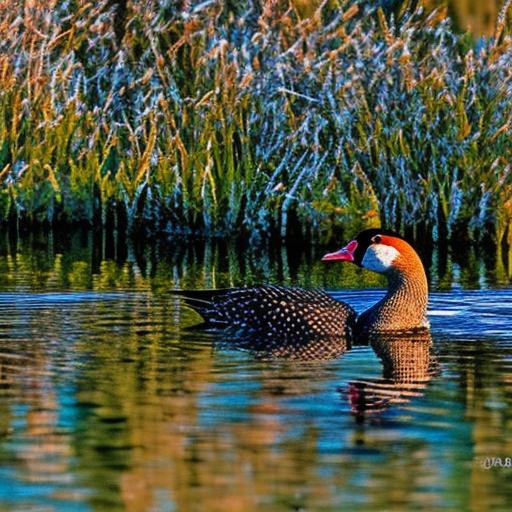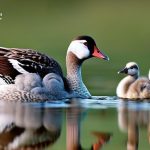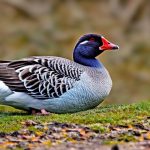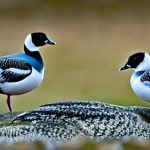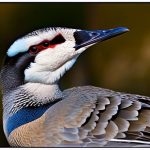Having geese in a pond can add a touch of beauty and tranquility to any outdoor space. The sight of these graceful creatures gliding across the water can be a delight to behold. However, along with their beauty, geese can also bring challenges. They are known for their aggressive behavior, territorial nature, and their tendency to leave behind droppings that can create a mess and pose health risks. In order to maintain a clean and safe environment, it is important to understand the behavior of geese and implement humane methods to deter them from the pond.
Key Takeaways
- Geese are social animals that prefer open spaces near water and grassy areas.
- Problem areas in the pound include open water, grassy areas, and easy access points.
- Physical barriers such as fences and netting can be effective in keeping geese out.
- Decoys and visual deterrents like reflective tape and predator silhouettes can also deter geese.
- Sound deterrents like distress calls and predator noises can be used to scare geese away.
Understanding the behavior of geese
Geese are social animals that live in flocks and are highly territorial. They are known to establish nesting sites near bodies of water, making ponds an attractive location for them. Geese are also known for their aggressive behavior, especially during nesting season when they are protecting their eggs or young goslings. They can become aggressive towards humans or other animals that they perceive as a threat.
Another challenge with geese is their tendency to leave behind droppings. A single goose can produce up to two pounds of droppings per day, which not only creates an unsightly mess but also poses health risks. The droppings can contain bacteria such as E.coli and Salmonella, which can contaminate the water and surrounding areas.
Identifying the problem areas in the pond
In order to effectively deter geese from the pond, it is important to identify the areas that attract them and cause problems. Geese are attracted to open areas near water where they can easily access food and nesting sites. They prefer areas with short grass where they can graze and keep an eye out for predators.
Problem areas in the pond may include open shorelines, docks, or areas with easy access to food sources such as grass or aquatic plants. Geese may also be attracted to areas with low vegetation or shrubs where they can hide and feel protected.
Installing physical barriers to keep geese out
One effective method to deter geese from the pond is to install physical barriers that prevent them from accessing the area. There are several types of physical barriers that can be used, including fences, netting, and floating barriers.
Fences can be installed around the perimeter of the pond to create a physical barrier that geese cannot easily cross. The fence should be at least three feet high and have a top that slopes outward to prevent geese from perching on it. Netting can also be used to cover areas where geese are likely to land or nest, such as docks or open shorelines.
Floating barriers can be placed in the water to create a physical barrier that prevents geese from swimming or landing in certain areas of the pond. These barriers can be made of materials such as plastic or wire mesh and should be anchored securely to prevent them from being moved by wind or water currents.
Using decoys and visual deterrents
Another method to deter geese from the pond is to use decoys and visual deterrents. Geese are territorial animals and will avoid areas where they see other geese. By placing decoys in the pond, such as plastic geese or swans, it can create the illusion of a larger flock and deter geese from landing or nesting in the area.
Visual deterrents such as scarecrows, reflective tape, or shiny objects can also be effective in scaring away geese. These visual deterrents create movement and noise that can startle geese and make them feel unsafe. It is important to regularly move or change the location of these deterrents to prevent geese from becoming accustomed to them.
Implementing sound deterrents

Sound deterrents can also be used to scare away geese from the pond. Geese are sensitive to loud noises and will avoid areas where they hear unfamiliar sounds. There are several types of sound deterrents that can be used, including propane cannons, ultrasonic devices, or recorded sounds of predators.
Propane cannons produce loud bangs or explosions at regular intervals to create a loud noise that scares geese away. Ultrasonic devices emit high-frequency sounds that are unpleasant to geese but not audible to humans. Recorded sounds of predators, such as barking dogs or bird distress calls, can also be effective in deterring geese.
Creating a habitat that is unappealing to geese
In addition to physical barriers and deterrents, making changes to the pond and its surroundings can also make it less appealing to geese. Geese are attracted to areas with short grass where they can easily graze. By allowing the grass around the pond to grow longer or planting taller vegetation, it can make the area less attractive to geese.
Adding rocks or gravel around the shoreline can also deter geese from landing or nesting in the area. Geese prefer open areas where they have a clear line of sight and can easily spot predators. By creating obstacles such as rocks or shrubs, it can make the area less appealing and provide hiding places for potential predators.
Regular maintenance and upkeep of the pond
Regular maintenance and upkeep of the pond is essential in deterring geese. This includes removing any debris or vegetation that may attract geese, such as fallen leaves or aquatic plants. It is also important to regularly clean up any droppings or feathers left behind by geese.
Maintaining a healthy ecosystem in the pond can also deter geese. This includes regularly testing and treating the water for algae or other issues that may attract geese. By maintaining a clean and healthy pond, it can make the area less appealing to geese and other wildlife.
Educating staff and visitors on proper behavior around geese
Educating staff and visitors on proper behavior around geese is crucial in maintaining a safe and peaceful environment. It is important to inform them about the aggressive nature of geese and the potential risks associated with approaching or feeding them.
Staff and visitors should be encouraged to keep a safe distance from geese and avoid approaching their nesting sites. Feeding geese should also be discouraged, as it can create dependency and attract more geese to the area.
Seeking professional assistance for persistent geese problems
In some cases, despite implementing various deterrent methods, geese may persistently return to the pond. In such situations, it may be necessary to seek professional assistance. Wildlife management professionals can provide expert advice and assistance in deterring geese from the pond.
They may recommend additional deterrent methods or provide trapping and relocation services if necessary. It is important to choose a professional who specializes in humane methods of wildlife management to ensure the well-being of the geese.
Adopting humane methods to deter geese from the pond
When dealing with geese problems, it is important to prioritize humane methods of deterrence. This means avoiding harmful or lethal methods that can cause unnecessary harm or distress to the geese.
Humane methods include using visual or sound deterrents, creating an unappealing habitat, and implementing physical barriers. It is important to regularly assess the effectiveness of these methods and make adjustments as needed.
In conclusion, understanding the behavior of geese and implementing humane methods to deter them from the pond is essential in maintaining a clean and safe environment. By identifying problem areas, installing physical barriers, using decoys and visual deterrents, implementing sound deterrents, creating an unappealing habitat, and regularly maintaining the pond, it is possible to effectively deter geese.
Educating staff and visitors on proper behavior around geese is also crucial in preventing conflicts and ensuring the well-being of both humans and geese. In cases of persistent geese problems, seeking professional assistance can provide expert advice and assistance. By adopting humane methods, we can coexist with geese and enjoy the beauty they bring to our outdoor spaces.
If you’re looking for effective ways to keep geese out of your pond, you might also be interested in learning about how to create a heater for your chicken coop. This article from Poultry Wizard provides valuable insights on keeping your chickens warm during the colder months. By installing a heater in your coop, you can ensure that your feathered friends stay comfortable and healthy all year round. Check out the article here to discover practical tips and recommendations for creating a cozy environment for your chickens.
FAQs
What are some effective ways to keep geese out of a pond?
There are several effective ways to keep geese out of a pond, including installing fencing or netting, using decoys or scare tactics, and modifying the pond’s landscape.
What type of fencing is best for keeping geese out of a pond?
A fence that is at least 3-4 feet tall and made of a sturdy material such as metal or plastic mesh is effective at keeping geese out of a pond. The fence should also be buried at least 6 inches into the ground to prevent geese from digging underneath it.
What are some effective scare tactics for keeping geese away from a pond?
Scare tactics such as loud noises, flashing lights, and motion-activated sprinklers can be effective at keeping geese away from a pond. Additionally, placing decoys of natural predators such as coyotes or owls near the pond can also deter geese.
How can modifying the landscape around a pond help keep geese away?
Modifying the landscape around a pond by adding tall grasses or shrubs can make the area less attractive to geese, as they prefer open spaces where they can easily see predators. Additionally, removing any food sources such as grass clippings or fallen fruit can also discourage geese from visiting the pond.
Meet Walter, the feathered-friend fanatic of Florida! Nestled in the sunshine state, Walter struts through life with his feathered companions, clucking his way to happiness. With a coop that’s fancier than a five-star hotel, he’s the Don Juan of the chicken world. When he’s not teaching his hens to do the cha-cha, you’ll find him in a heated debate with his prized rooster, Sir Clucks-a-Lot. Walter’s poultry passion is no yolk; he’s the sunny-side-up guy you never knew you needed in your flock of friends!

